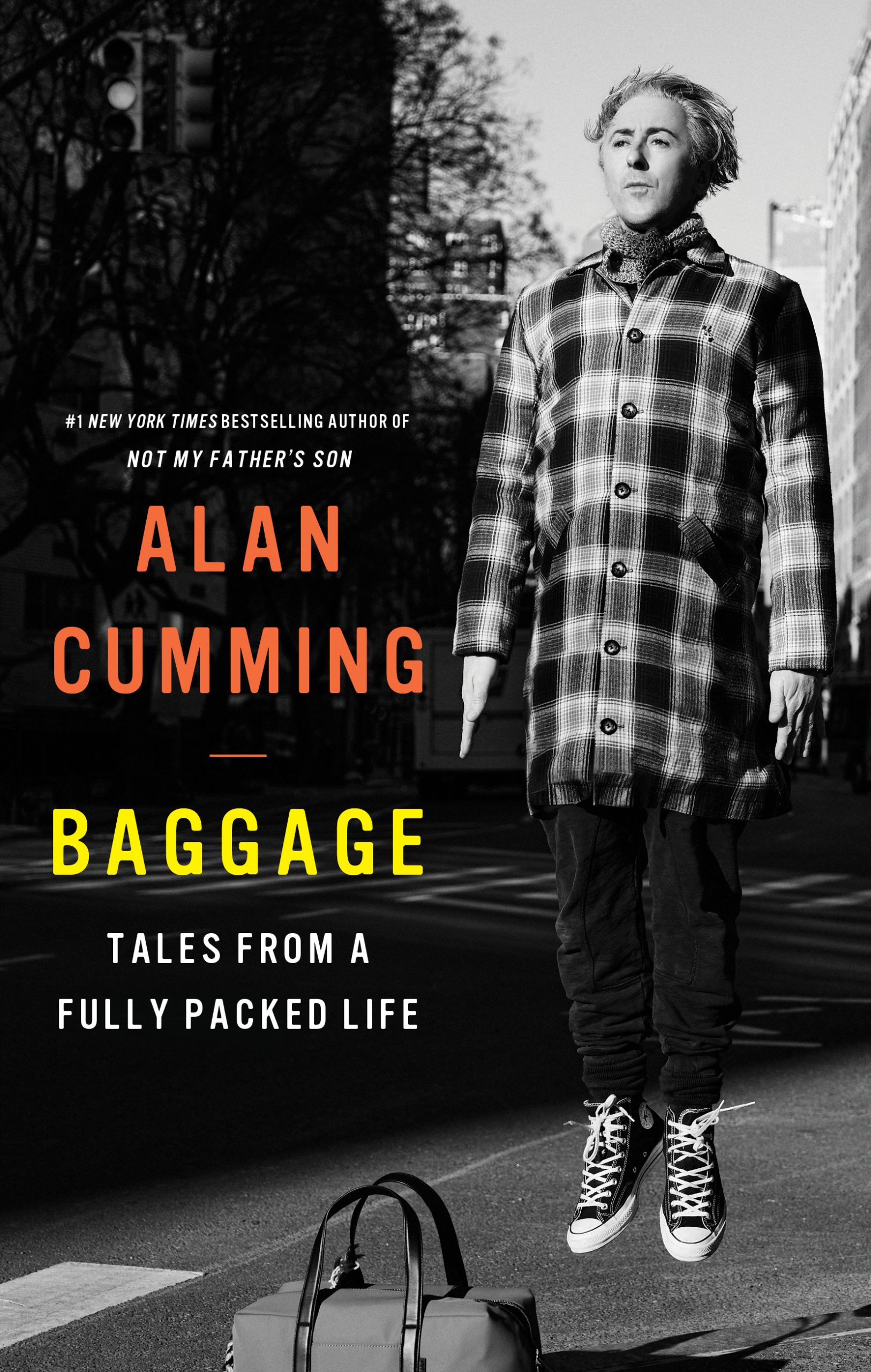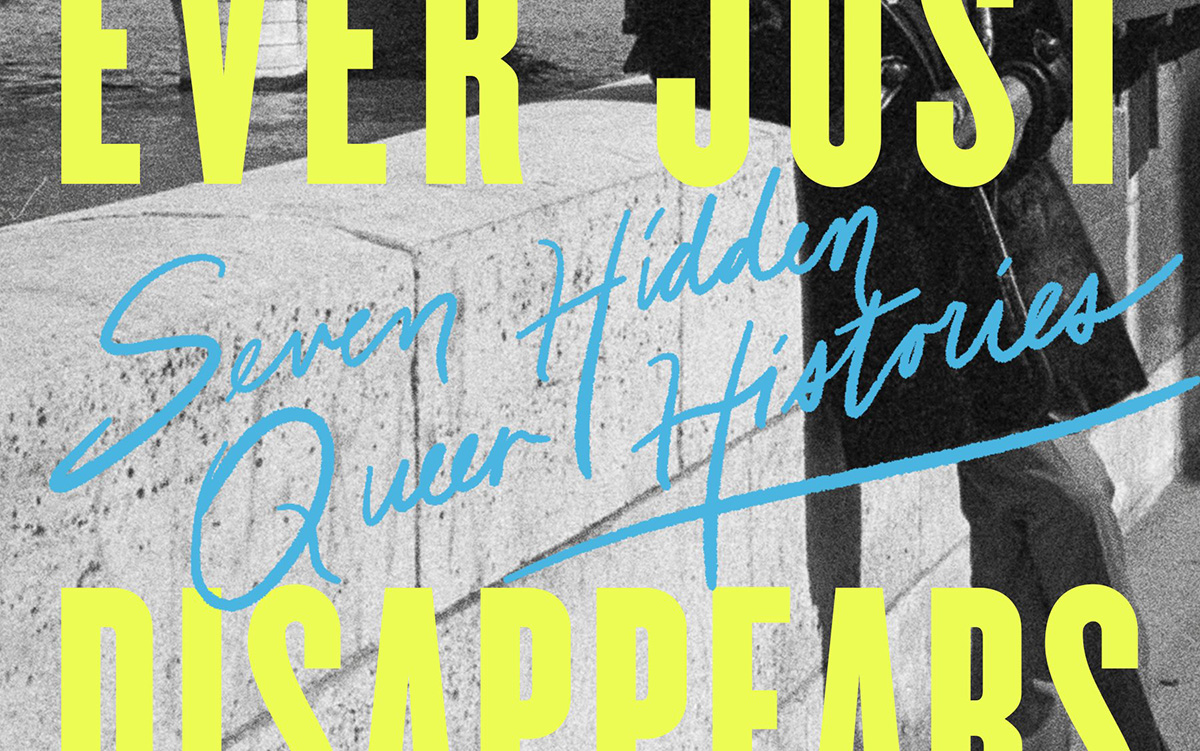Books
Cumming’s new book filled with showbiz tales
But ‘Baggage’ is no vapid, Tinsel Town celeb concoction

It was the night of the Tony Awards. Actor, singer, writer, and activist Alan Cumming had just received a Tony for his performance as the emcee in the 1998 revival of “Cabaret.” He was in the press room, giving soundbites to the media.
In the middle of one interview, “A hand appeared on my left shoulder, a tall body joined it to my right,” Cumming, who was born and grew up in rural Scotland, writes in his new memoir “Baggage: Tales From a Fully Packed Life.”
For a second, Cumming thought he was being mugged. But, the stranger hugging him was Sean Connery, a fellow Scot, known for playing James Bond. Connery had won a Tony as a producer of the play “Art.” Connery, looking into the cameras, said of Cumming, “This is my new son.”
He took Ecstasy that night at the Tonys, Cumming reveals in “Baggage.” The drug for him was, ”my self-prescribed anti-anxiety medication,” Cumming writes, “And it worked.”
For most of us, winning a Tony for an acclaimed revival of “Cabaret” would be merely a fantasy. For Cumming, winning the prestigious award is just one of many accomplishments.
Walt Whitman said he contained multitudes. Cumming, 56, who is bisexual and married to the illustrator Grant Shaffer, is Whitman on octane.
Cumming is a polymath. He has appeared in numerous films, plays and TV shows. He’s written two children’s books; a novel; a book of photographs and stories; and the memoir “Not My Father’s Son.”
His film roles range from the James Bond movie “GoldenEye” to “Eyes Wide Shut” to the “Spy Kids” trilogy. Cumming has won the Olivier, BAFTA and Emmy for his stage and screen work. On the London stage, Cumming has performed in “Hamlet,” “Bent” and other plays.
He has appeared in the “Threepenny Opera” and “Design for Living” on Broadway. Cumming created and appeared in his one-man adaptation of “Macbeth.”
On TV, he is known for playing Eli Gold on “The Good Wife” and Dylan Reinhart on “Instinct,” the first broadcast television drama to have a lead gay character. Recently, Cumming played Mayor Aloysius Menlove on the Apple TV+ show “Schmigadoon!”
All of this would exhaust most of us. But Cumming has energy to spare. He hosts the podcast “Alan Cumming’s Shelves” and is the amateur barman at Club Cumming in New York City.
Cumming is known for his LGBTQ rights advocacy. He has worked for marriage equality in Scotland and with the Human Rights Campaign and other LGBTQ organizations.
In 2009, Cumming was appointed an OBE in the Queen’s Birthday Honors List. In “Baggage,” Cumming writes that he received this honor because of his work for LGBT rights.Cumming’s first memoir “Not My Father’s Son” is the story of his harrowing childhood. Growing up, Cumming endured physical and psychological abuse and violence from his father. In the memoir, Cumming grapples with secrecy and shame and with the post traumatic stress brought on by his father’s sadistic treatment of him. “There is never shame in being open and honest,” he writes.
“Baggage” tells many entertaining showbiz stories. Who wouldn’t want to hear the tales of a writer whose friends include Liza (as in Liza with a Z)?
Yet, “Baggage” isn’t a vapid, Tinsel Town celeb concoction. In “Baggage,” Cumming examines his relationships to his family, significant others and himself. It begins with his divorce from the actress Hilary Lyon and ends with his marriage to Shaffer.
Cumming, who has dual United Kingdom/United States citizenship, talked with the Blade by phone about a range of topics from “Baggage” to politics to getting Helen Mirren on board with crocs.
Cumming was pleased by the positive response to “Not My Father’s Son.” He was happy that readers felt his words helped them to confront people who had abused them and to “reckon” with their shame.
But, Cumming worried that people might think he’d “triumphed” over the despair caused by his father’s abuse. That he’d never encounter this trauma again.
“I wrote ‘Baggage,’” Cumming said, “to overcome this idea of triumph.”
“You don’t actually recover,” he added, “you manage it. You always have to manage it.”
Cumming is witty and exudes hopefulness. But, he’s worried about what the future might bring for LGBTQ and women’s rights. The election of Joe Biden as president “was a real reprieve,” Cumming said, “but the way we’re headed, things could go the other way any second.”
We need to be vigilant, Cumming said. “Women’s rights – with what’s happening with abortion in Texas – are in real danger,” he said.
But life isn’t all worries for Cumming.
There is his work. In 2022, he’ll continue performing “Och and Oy! A Considered Cabaret” with NPR’s Ari Shapiro. He’s making the film “Rare Objects” with Katie Holmes.
And there are his friends. “Liza is lovely,” Cumming said of his friend Liza Minnelli. One day, Cumming was rehearsing with Minnelli. Along with Joel Grey, Bebe Neuwirth, Chita Rivera and other celebs, they were going to put on a salute to the songwriting team Kander and Ebb.
They were going to perform Minnelli’s signature song “New York, New York.” “It looked so easy,” Cumming said, “But I couldn’t get Liza’s dance moves. First, Liza tried to help me.”
But, without success. “Then Chita came over to help me,” Cumming said, “it was overwhelming having two legends trying to teach me.”
After these attempts failed, Minnelli said to him, “Oh, darling, just make it your own!”
There was the time when Cumming made Helen Mirren see the light on Crocs. He was in Hawaii filming “The Tempest” with Mirren. “We were in the desert. I’d wear my Crocs,” he said, “she said my Crocs were ugly.”
“I said, ‘Helen, that’s fair enough. But when I say things are ugly, I use my inside voice,’” Cumming added.
A few weeks later, Cumming saw Mirren. She was wearing Crocs. “She said she’d been wearing flip-flops and they made her feet sore. Now she loved Crocs.”
“I told her ‘you were a hater, now you’re a lover,” Cumming added, “It’s a beautiful thing.”
Cumming is currently on a book tour in the U.K. The tour stops in Miami on Nov. 20; Chicago on Nov. 21 and several other U.S. cities through spring 2022. For more info on Cumming’s new book, visit alancumming.com.

Books
New book offers observations on race, beauty, love
‘How to Live Free in a Dangerous World’ is a journey of discovery

‘How to Live Free in a Dangerous World: A Decolonial Memoir’
By Shayla Lawson
c.2024, Tiny Reparations Books
$29/320 pages
Do you really need three pairs of shoes?
The answer is probably yes: you can’t dance in hikers, you can’t shop in stilettos, you can’t hike in clogs. So what else do you overpack on this long-awaited trip? Extra shorts, extra tees, you can’t have enough things to wear. And in the new book “How to Live Free in a Dangerous World” by Shayla Lawson, you’ll need to bring your curiosity.

Minneapolis has always been one of their favorite cities, perhaps because Shayla Lawson was at one of Prince’s first concerts. They weren’t born yet; they were there in their mother’s womb and it was the first of many concerts.
In all their travels, Lawson has noticed that “being a Black American” has its benefits. People in other countries seem to hold Black Americans in higher esteem than do people in America. Still, there’s racism – for instance, their husband’s family celebrates Christmas in blackface.
Yes, Lawson was married to a Dutch man they met in Harlem. “Not Haarlem,” Lawson is quick to point out, and after the wedding, they became a housewife, learned the language of their husband, and fell in love with his grandmother. Alas, he cheated on them and the marriage didn’t last. He gave them a dog, which loved them more than the man ever did.
They’ve been to Spain, and saw a tagline in which a dark-skinned Earth Mother was created. Said Lawson, “I find it ironic, to be ordained a deity when it’s been a … journey to be treated like a person.”
They’ve fallen in love with “middle-American drag: it’s the glitteriest because our mothers are the prettiest.” They changed their pronouns after a struggle “to define my identity,” pointing out that in many languages, pronouns are “genderless.” They looked upon Frida Kahlo in Mexico, and thought about their own disability. And they wish you a good trip, wherever you’re going.
“No matter where you are,” says Lawson, “may you always be certain who you are. And when you are, get everything you deserve.”
Crack open the front cover of “How to Live Free in a Dangerous World” and you might wonder what the heck you just got yourself into. The first chapter is artsy, painted with watercolors, and difficult to peg. Stick around, though. It gets better.
Past that opening, author Shayna Lawson takes readers on a not-so-little trip, both world-wide and with observant eyes – although it seems, at times, that the former is secondary to that which Lawson sees. Readers won’t mind that so much; the observations on race, beauty, love, the attitudes of others toward America, and finding one’s best life are really what takes the wheel in this memoir anyhow. Reading this book, therefore, is not so much a vacation as it is a journey of discovery and joy.
Just be willing to keep reading, that’s all you need to know to get the most out of this book. Stick around and “How to Live Free in a Dangerous World” is what to pack.
The Blade may receive commissions from qualifying purchases made via this post.
Books
Story of paralysis and survival features queer characters
‘Unswerving: A Novel’ opens your eyes and makes you think

‘Unswerving: A Novel’
By Barbara Ridley
c.2024, University of Wisconsin Press
$19.95 / 227 pages
It happened in a heartbeat.
A split-second, a half a breath, that’s all it took. It was so quick, so sharp-edged that you can almost draw a line between before and after, between then and now. Will anything ever be the same again? Perhaps, but maybe not. As in the new book “Unswerving” by Barbara Ridley, things change, and so might you.

She could remember lines, hypnotizing yellow ones spaced on a road, and her partner, Les, asleep in the seat beside her. It was all so hazy. Everything Tave Greenwich could recall before she woke up in a hospital bed felt like a dream.
It was as though she’d lost a month of her life.
“Life,” if you even wanted to call it that, which she didn’t. Tave’s hands resembled claws bent at the wrist. Before the accident, she was a talented softball catcher but now she could barely get her arms to raise above her shoulders. She could hear her stomach gurgle, but she couldn’t feel it. Paralyzed from the chest down, Tave had to have help with even the most basic care.
She was told that she could learn some skills again, if she worked hard. She was told that she’d leave rehab some day soon. What nobody told her was how Les, Leslie, her partner, girlfriend, love, was doing after the accident.
Physical therapist Beth Farringdon was reminded time and again not to get over-involved with her patients, but she saw something in Tave that she couldn’t ignore. Beth was on the board of directors of a group that sponsored sporting events for disabled athletes; she knew people who could serve as role models for Tave, and she knew that all this could ease Tave’s adjustment into her new life. It was probably not entirely in her job description, but Beth couldn’t stop thinking of ways to help Tave who, at 23, was practically a baby.
She could, for instance, take Tave on outings or help find Les – even though it made Beth’s own girlfriend, Katy, jealous.
So, here’s a little something to know before you start reading “Unswerving”: author Barbara Ridley is a former nurse-practitioner who used to care for patients with spinal cord injuries. That should give readers a comfortable sense of satisfaction, knowing that her experiences give this novel an authenticity that feels right and rings true, no faking.
But that’s not the only appeal of this book: while there are a few minor things that might have readers shaking their heads (HIPAA, anyone?), Ridley’s characters are mostly lifelike and mostly likable. Even the nasties are well done and the mysterious character that’s there-not-there boosts the appeal. Put everyone together, twist a little bit to the left, give them some plotlines that can’t ruined by early guessing, and you’ve got a quick-read novel that you can enjoy and feel good about sharing.
And share you will because this is a book that may also open a few eyes and make readers think. Start “Unswerving” and you’ll (heart) it.
The Blade may receive commissions from qualifying purchases made via this post.
Books
Examining importance of queer places in history of arts and culture
‘Nothing Ever Just Disappears’ shines with grace and lyrical prose

‘Nothing Ever Just Disappears: Seven Hidden Queer Histories’
By Diarmuid Hester
c.2024, Pegasus Books
$29.95/358 pages
Go to your spot.
Where that is comes to mind immediately: a palatial home with soaring windows, or a humble cabin in a glen, a ramshackle treehouse, a window seat, a coffeehouse table, or just a bed with a special blanket. It’s the place where your mind unspools and creativity surges, where you relax, process, and think. It’s the spot where, as in the new book “Nothing Ever Just Disappears” by Diarmuid Hester, you belong.

Clinging “to a spit of land on the south-east coast of England” is Prospect Cottage, where artist and filmmaker Derek Jarman lived until he died of AIDS in 1994. It’s a simple four-room place, but it was important to him. Not long ago, Hester visited Prospect Cottage to “examine the importance of queer places in the history of arts and culture.”
So many “queer spaces” are disappearing. Still, we can talk about those that aren’t.
In his classic book, “Maurice,” writer E.M. Forster imagined the lives of two men who loved one another but could never be together, and their romantic meeting near a second-floor window. The novel, when finished, “proved too radical even for Forster himself.” He didn’t “allow” its publication until after he was dead.
“Patriarchal power,” says Hester, largely controlled who was able to occupy certain spots in London at the turn of the last century. Still, “queer suffragettes” there managed to leave their mark: women like Vera Holme, chauffeur to suffragette leader Emmeline Pankhurst; writer Virginia Woolf; newspaperwoman Edith Craig, and others who “made enormous contributions to the cause.”
Josephine Baker grew up in poverty, learning to dance to keep warm, but she had Paris, the city that “made her into a star.” Artist and “transgender icon” Claude Cahun loved Jersey, the place where she worked to “show just how much gender is masquerade.” Writer James Baldwin felt most at home in a small town in France. B-filmmaker Jack Smith embraced New York – and vice versa. And on a personal journey, Hester mourns his friend, artist Kevin Killian, who lived and died in his beloved San Francisco.
Juxtaposing place and person, “Nothing Ever Just Disappears” features an interesting way of presenting the idea that both are intertwined deeper than it may seem at first glance. The point is made with grace and lyrical prose, in a storyteller’s manner that offers back story and history as author Diarmuid Hester bemoans the loss of “queer spaces.” This is really a lovely, meaningful book – though readers may argue the points made as they pass through the places included here. Landscapes change with history all the time; don’t modern “queer spaces” count?
That’s a fair question to ask, one that could bring these “hidden” histories full-circle: We often preserve important monuments from history. In memorializing the actions of the queer artists who’ve worked for the future, the places that inspired them are worth enshrining, too.
Reading this book may be the most relaxing, soothing thing you’ll do this month. Try “Nothing Ever Just Disappears” because it really hits the spot.
The Blade may receive commissions from qualifying purchases made via this post.
-

 State Department3 days ago
State Department3 days agoState Department releases annual human rights report
-

 South America1 day ago
South America1 day agoArgentina government dismisses transgender public sector employees
-

 Maryland5 days ago
Maryland5 days agoJoe Vogel campaign holds ‘Big Gay Canvass Kickoff’
-

 District of Columbia1 day ago
District of Columbia1 day agoCatching up with the asexuals and aromantics of D.C.












